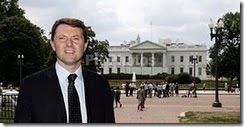
When the debate over the McCanns’ behaviour on May 3 was at its height the couple’s defenders often put forward the “modified profiling” argument.
Pure profiling – the claim that the probability of involvement in a crime is scientifically linked to personality traits and evidence of past “criminality” - is, of course, a pseudo science developed largely by the Nazis and unworthy of discussion. The “modified version”, though, claims that as worthy respectable citizens, professionals even, with no background of offending, the McCanns were intrinsically less likely to have done something nasty on May 3 than “criminal types”, you know, the sort of people like God-sent Mr Hewitt or the various horror-film portraits of suspects at the Team’s press shows.Buttressing this argument, as the somewhat unworldly Portuguese prosecutor pointed out, is the fact that the couple went on behaving as “normal” people do all through that evening. Kate McCann would have to be a wicked simulator indeed to have acted normally knowing that the child had already come to harm. And happy Gerry McCann, the loving parent who “romped” with his children and their friends, who was beside himself with shock and terror at the loss of his daughter, behaving as David Payne said “exactly” as one would expect after such a tragedy – was it really conceivable that this provincial doctor had the qualities required to initiate and put into practice a nerveless cover-up in self-defence that night?
It is an argument that has continued to appeal, though it is slightly weakened in Kate’s case by her performances when posing daily for campaign-led photo ops in the weeks after May 3, able to turn on with ease the role and expression requested by the surrounding press pack - soulful, grief stricken, determined, stoical, lost:she was, they say, a “natural”. Still, nobody recalls her behaving in a ruthless or even unloving manner prior to 2007, let alone showing the sort of Lady Macbeth-like qualities implied by the theories of the Portuguese police. No wonder that fair-minded people rightly find it hard to accept the idea of her involvement in something chilling.
And the same goes for Gerry. When had anyone ever claimed to witness the devious ruthlessness and suppression of all personal feelings needed to carry through such a plan of deception? How could someone without any experience of crime and deceit suddenly act so decisively while presenting a mask to the rest of the world?
While readers of the Cracked Mirror might pause, as the author did when writing it, at the extent of the pair’s apparent unknowability in earlier years, that is no reason to reject the argument.
But could the Truth of the Lie affair throw some light on it?
Once the book had been published the McCanns made no secret of their eventual intention to sue Amaral for libel. Quite understandable too, if they were innocent, as was an appropriate claim for damages: everyone has the right to defend a reputation under attack.
So Dr. Gerald McCann took legal action against the man who had libelled him and his wife. The manner of his doing so, however, makes one, again, pause for thought.
The parents were frank, via nice Ed “expunge it” Smethurst, that they would seek an injunction in Portugal to silence his claims, preparatory to a full libel hearing. But there was no hint of the intensity of the coming attack: instead there was deception, deliberately implying that their aims were moderate and defensive. “The intention,” said their spokesman in May 2009, “in suing Mr Amaral is simply to censure him.He has been publicising his book across Europe and they just think enough is enough.”
In western societies a libel case is normally about the future suppression of the libel and financial restitution: it is about withdrawal and compensation. The concept of personal retribution and vengeance for a non-criminal libel is not normally part of European law. But the actual writ, as revealed in July, was certainly heading that way, not at all a matter of mere censure. Apart from claiming a list of mental and physical ailments, apparently attributable to Amaral, that, if true, would have made them unfit for work, even on the Oprah show, they wanted upwards of a million in damages and, as the lawyer Duarte made clear, Amaral should be “punished.”
And when the injunction was eventually granted at the second attempt it was unprecedented, as we know, in the extremism of its attack on Amaral and his family’s liberties rather than a “silencing” of his claims. The McCanns had explicitly worked on and asked for these measures while, for public consumption, remaining silent about their demands. Quite a performance and even Amaral himself, who has seen plenty of aggression and deviousness in his career, was taken aback by the extent and venom of the onslaught.
No, we are not about to get the violin out for Goncalo Amaral. Yes, people can argue that Amaral deserved what he got. But the question here, whichever side one supports, is what does the history of the McCanns versus Amaral tell us about Gerry McCann, his abilities and his “profile”?
It is unarguable that the legal means adopted by McCann against Amaral have involved lies and deception (“we only wish to censure” “we’re here in Portugal to build bridges”), secrecy (masking the extreme nature of his demands until the injunction was granted in September), ruthlessness (obviously) and indifference to human feeling (the known grief and pain caused to Amaral’s wife in particular).
So which profile of McCann does this performance fit – the clean and harmless cardiologist of fond remembrance, “Good old Gerry”, or someone quite different, someone with a talent for secrecy, ruthlessness and indifference to human feeling when self-defence is involved?

http://blacksmithbureau.blogspot.com/2010/11/so-which-is-real-one.html
